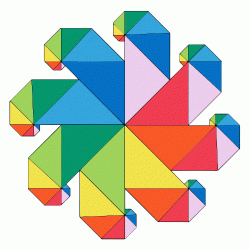As I am learning more about the nervous system and about trauma, I am better able to see, notice, and understand what happens in my body. Basically I almost never really feel ok. Sometimes I feel pretty ok, but I’m still not whole-heartedly enthusiastic or joyfully or fully embodied. And much of the time, whatever level of ok I feel, it’s fragile, it can easily be derailed by conflict, stress or confusion. One way of explaining this is that I can get thrown off balance by something that is a trigger of a past trauma. And sometimes that’s clealy what happens – I notice my whole body moving rather quickly from relative stability into being wired, alert, concerned, distressed, and unable to feel calm.
But I believe that there is a different dynamic that also occurs. Here is what I think is going on. My post-traumatic nervous system is never actually at ease. When I feel pretty ok it is because the combination of mitigations that I have put in place is working. I’m not organically ok; rather, I’ve arranged to feel and function ok because of the various things I’m doing to take care of myself. Here are some examples of things I do to take care of myself; that is, to regulate my nervous system.
- I do jigsaw puzzles on line. Sometimes a 20 piece puzzle that takes 3 minutes to solve will settle me. Sometimes it takes a 100 or 200 piece puzzle, that takes 8 to 30 minutes.
- I choose a task to do and go and do it. Put out the trash. Wash some dishes. Brush my teeth. Something that needs to be done. I think of it, I stand up, I do the task, I complete it. There is something in the experience of completion that has a regulating effect.
- Chocolate, alcohol, food in general.
- Focusing on my job, methodically performing one work task after another. If I have work tasks to do that are not too complex or difficult, then just doing and doing can turn down the noise and lead to my feeling settled.
- Lie in bed for several minutes after waking and before getting up, to pull myself together.
I label all of these as medication. They are medications in treatment of the distress in my nervous system. When they work, I find myself in a state where I am not noticing any emotions, and where I am able to methodically and effectively function. But that state can be fragile. Any interruption might destroy the balance. Any high emotion might destroy the balance so badly that it takes me an hour to recover. Or a conflict might put me into a state where it takes me many hours to get back to a steady state. I believe that this is the essence of post-trauma. I assume that the details of how we experience this vary from person to person – but I’m guessing that there is some similarity at the core, where I just don’t feel completely ok, and I have to work at feeling as ok as possible. These medications that we use are most often unconscious. I just have the urge to eat or drink or take a puzzle break. Addictions fit in here as well. If I am using an addictive substance as a medication, then the physical effects of addiction compound the already-existing challenges of maintaining a delicate balance in the state of my nervous system.
So – what to do with all of this? Here are some things that can help:
Befriend my own habits.
When I am doing something that I judge is not good for me – like doing an hour-long puzzle when I have lots of important tasks facing me – I tend to allow myself the diversion (medication) but as soon as I’m done, or even while I am medicating, I am also dreading the consequences of losing that time.
So my new intention is to allow, invite, and enhance the soothing impacts of the medication by making a conscious decision to accept what I am doing. Because I’m doing it anyway, so why not work with myself rather than against myself?
Pay attention to what the upset feels like, and to how the habit or medication affects the experience of upset.
This ties in with the point above. By default we tend to not have a direct awareness of the distress in our nervous systems. The impulse to medicate just feels like an impulse, but we don’t really FEEL the imbalance that is triggering the impulse.
So my intention is to notice what I feel – how at ease am I, how un-easeful do I feel? Then notice what happens to those sensations or energies as I partake in the medication, whatever type of medication I am using. That can be a bit tricky if the medication is an activity that requires full attention. But in that case, I can periodically pause and check in with myself.
Identify my medication options, look for new options, be choosy about my options.
Sometimes I experience a false choice – I think that either I need to buckle down and do my “chores” or I am going to do a particular diversion – food/task/procrastination activity. But what about door number 3? I could stand up, do jumping jacks, stretch, pat, massage or tap myself, dance, or something else that is physical or creates movement. I could sing a song. Or pray. Or reflect on what I’m grateful for. Or growl about what I am angry about.
My intention is to make a list of all of the choices that I have for when feel I need to do something to regulate my nervous system. And then when I have that urge, I can train myself to mentally consult the list and not necessarily do the first thing that I have the urge to do.
Continual forgiveness.
I am going to keep doing things that I judge are not the best things for me to do. I’m going to do it because underneath this nervous system distress is actually more pain/grief/need/upset/helplessness/horror/etc than I can know. As I do my personal healing work, I get windows into the old trauma. Sometimes the windows are clean and I can see clearly. Sometimes they are dusty and I can only see shapes and outlines of what might have happened. But there is a lot there, and it is overwhelming. That’s why I’m in this condition, because I’m holding experiences that are overwhelming.
So it is exquisitely useful to forgive myself at every turn. That doesn’t mean that I give up on trying all different ways to get myself to do it differently, in ways that work better. But it means that I have compassion; I remember that this IS my best, and my work is to keep making it better and to be gentle with myself through that process.

